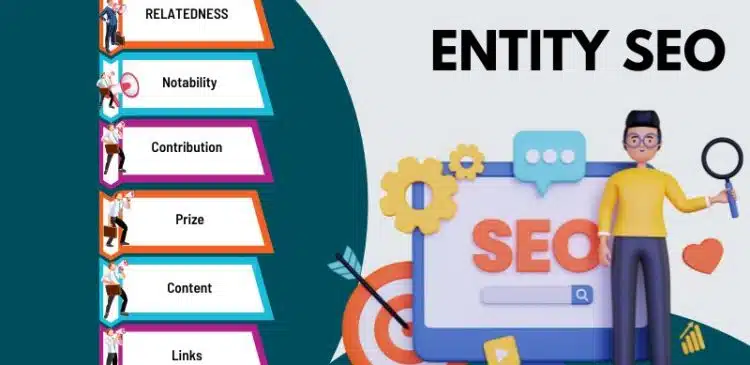How to Find Related Entities for SEO: A Comprehensive Guide

To keep up in the ever-changing world of SEO, you need to do more than just focus on keywords and backlinks. One important aspect of modern search engine optimization that is often overlooked is related entities. Entities are unique identifiers such as people, places, brands or concepts which help search engines understand and categorize content.
Using related entities can greatly increase the relevance of your material, improve its visibility in search results pages (SERPs), and cement stronger topical authority. This ultimate guide provides step-by-step instructions for finding related entities for SEO with practical tips for optimizing your text so it performs well on search engines while engaging readers too.
What Are Entities in SEO?
An entity is a specific thing or idea that can be distinguished from other things. People, places, brands, products – everything that has its own name falls under this category. Examples of suchlike entities include New York City, Elon Musk or Coca Cola.
The way search engines work is they associate one piece of information with another across the internet using entities. Knowing what an entity is and how it relates to other things helps a search engine deliver better results. If you type “Tesla” into Google for instance, it understands Tesla is an electric car brand and knows about the connection between Tesla, Elon Musk and electric vehicles as well.
Why Are Related Entities Important for SEO?
Related Entities can assist search engines in understanding what your content is about. If your content refers to relevant entities, it will be more likely to show up in searches based on related inquiries. This can result in better rankings, greater visibility and more organic traffic.
For instance, suppose you have a site on “digital marketing.” In such a case, having associated concepts such as “SEO,” “content advertising,” “social media” or even “Google Analytics” will help search engines realize how extensive your content goes into the subject matter and consequently make it more relevant.

How to Find Related Entities for SEO
To find related entities for SEO, you will have to go through a number of steps. Here are some effective approaches that can be employed.
Google’s Knowledge Graph
Google’s Knowledge Graph is a helpful feature for finding related entities. When you type in a query, Google frequently presents a knowledge panel on the right of the search results page. This panel offers more information about associated entities and concepts. For instance, if you look up “SEO,” you may see “content marketing,” “Google Analytics,” and “search engine” under the heading “Related entities”.
Use this data to recognize the entities that related to your content and implement them on your website.
Google Search Suggestions
Google search suggestions can give you an idea of related entities. Whenever you start typing a query into Google’s search bar, it offers suggestions for related searches. These are the result of frequent searches and can indicate what people commonly look up in relation to a topic.
As an example, if you type “SEO tools,” you might be given suggestions such as “keyword research tools,” “backlink analysis tools,” and “on-page SEO tools.” These are all related entities that could be included in your content.
Wikipedia
Wikipedia is also a great place to look for related entities. Wikipedia articles often link to other articles that are relevant, allowing you to find entities connected to your subject.
If you were writing about “artificial intelligence” for example, a Wikipedia page might have links to “machine learning”, “neural networks” or “deep learning” among other things. Following these connections could lead you to entities that had never crossed your mind before.
SEO Tools
There are a number of SEO tools that can help you find related entities. For instance, Ahrefs, SEMrush and Moz have features which enable users to examine content as well as locate keywords and entities which are related to them.
For instance, Content Explorer by Ahrefs is capable of finding out what content ranks best for your target keyword. By studying such a piece of content, you will be able to identify those entities that are commonly mentioned alongside your focus entity.
Natural Language Processing (NLP) Tools
Natural language processing (NLP) tools are capable of analyzing text and identifying entities. The Natural Language API developed by Google can extract entities from your content or that of your competitors.
To make your content extensive, ensure that you use NLP tools to find the related entities that are most important to your topic.
How to Incorporate Related Entities into Your Content
When you have found related entities, it is crucial to use them well in your content. Here are some suggestions.
Use Entities Naturally
Include relevant entities into your content in a natural way. Also, do not stuff keywords or include entities where they are irrelevant. Make sure that your content remains informative and easy to read.
Create Topic Clusters
Topic clusters can help organize content around related entities very effectively. One method of using topic clusters is by creating a pillar page that broadly covers a specific subject and linking it to cluster pages that provide more detailed information about closely related topics. By doing this, search engines will better understand how your content relates to the subjects you are trying to rank for.
Optimize On-Page SEO
Make certain that your meta tags, headings, and alt text exhibit related entities. This helps search engines understand what your content is about.
Build Internal Links
Connect related entities on your website using internal linking. This will not only enhance user experience but also enable search engines to appreciate the associations between various pages and objects within your site.
Monitor and Update Regularly
In search engine optimization, continuous optimization of related entities is necessary. Therefore, it is important to keep track of how well your content performs and make adjustments as new ideas or broader concepts about the topic arise.
Conclusion
It is important to find and include related entities in your SEO strategy so that your content becomes more relevant and visible. There are several ways to do this using Google’s Knowledge Graph, Wikipedia, SEO tools, and NLP tools will help you discover those entities which can improve the depth of your content and make it authoritative.
The main aim is to give meaningful and all-inclusive information that is helpful for both the audience and the search engines. Optimizing for related entities will enable you get better search visibility as well as enhance overall SEO performance.


 Bill Yeager, Co-Owner of High Point SEO & Marketing in CT
Bill Yeager, Co-Owner of High Point SEO & Marketing in CT